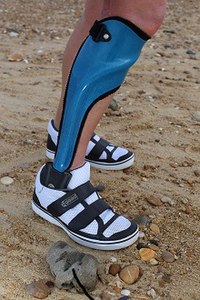
Photo from wikipedia
OBJECTIVE To assess whether targeted neuromuscular exercises can decrease knee loading of adolescent pre-professional footballers with high knee loading as identified with the field-based Drop Vertical Jump Test (DVJT). DESIGN… Click to show full abstract
OBJECTIVE To assess whether targeted neuromuscular exercises can decrease knee loading of adolescent pre-professional footballers with high knee loading as identified with the field-based Drop Vertical Jump Test (DVJT). DESIGN Prospective controlled trial, conducted between August and November 2016 at Erasmus Medical Centre, The Netherlands. METHODS Pre-professional football players (aged 14-21years) were evaluated at baseline and after 12weeks follow-up with the field-based DVJT. The field-based DVJT is a standardised test in which a player drops from a box and jumps up immediately after landing; knee load is calculated based on five parameters. Players with high knee load (probability≥0.75) from one club performed regular training(control group), and players with high knee load from another other club performed targeted neuromuscular exercises for 12weeks (intervention group). The difference of change in knee load between both groups after 12weeks was the primary outcome measure. RESULTS Of 107 eligible players, 75 had a high knee loading. Knee loading decreased in both groups after 12weeks of training, but change in probability of high knee load was not significantly different between both groups (95% Confidence Interval [-0.012-0.082], p=0.139). CONCLUSION Targeted neuromuscular exercises had no additional effect in decreasing knee loading of adolescent male pre-professional football players compared to regular training. TRIAL REGISTRATION NUMBER The Netherlands Trial Register (ID number: 6044).
Journal Title: Journal of science and medicine in sport
Year Published: 2019
Link to full text (if available)
Share on Social Media: Sign Up to like & get
recommendations!